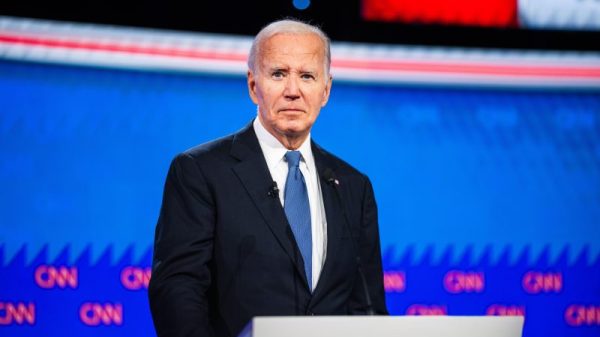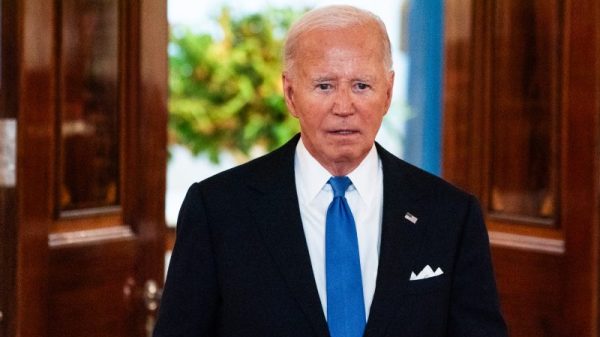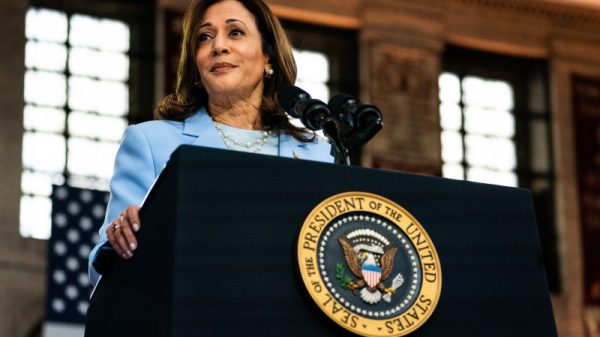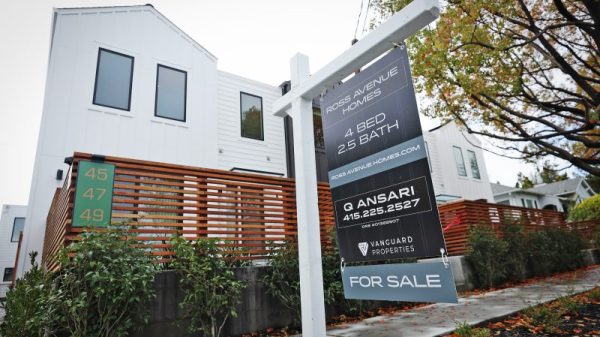During House Republicans’ annual retreat earlier this year, lawmakers had the option of attending a variety of policy briefings led by their colleagues, including one on leadership’s pursuit of border security legislation.
All three briefers were White, represented districts far from the U.S.-Mexico border, and belonged to the far-right flank of the conference. The decision to have those lawmakers — Judiciary Chair Jim Jordan (R-Ohio), Homeland Security Chair Mark Green (R-Tenn.), and Rep. Tom McClintock (R-Calif.), who chairs the Judiciary subcommittee on immigration — lead the briefing raised eyebrows for several Hispanic House Republicans.
Some considered the lineup a missed opportunity to highlight the perspective of lawmakers whose personal appeals to their Hispanic communities helped clinch Republicans the House majority in 2022. That majority now includes an array of fresh opinions on how best to influence and discuss legislation related to border security and immigration that directly affects those lawmakers’ districts.
The optics from the March retreat in Florida are something members of the Congressional Hispanic Conference are hoping to avoid in the future. Consisting of Hispanic House Republicans and boasting a record membership of 16 lawmakers and two delegates, the group is working to take advantage of Republicans’ slim majority to leverage their insight on issues that are deeply personal.
Earlier this year, as Republicans worked to pass a border security bill, the conference had to hear out the concerns of at least three Hispanic lawmakers representing the U.S.-Mexico border, three Cuban Americans from South Florida, and nine vulnerable Hispanic incumbents whose seats are critical to keeping the majority.
“It’s hard to challenge somebody that was born in Cuba. It’s hard to challenge somebody that has gone through the naturalization process. It’s hard to challenge somebody that represents almost half of the border. You may want to, you may try to, but it’s very difficult to do,” said Rep. Tony Gonzales, a second-term Republican lawmaker who represents a large portion of the Texas-Mexico border. “You can’t take us for granted. You can’t just brush us off.”
Hispanic voters have historically voted in large numbers for Democrats, but in recent years, Republicans have peeled away some of that support during presidential election cycles. And a recent Pew Research Center poll about the 2022 midterms found that Hispanic support for Democrats dropped from 72 percent in 2018 to 60 percent in 2022. While Democrats still have an advantage, they did not win back voters they appeared to have lost to Republicans in 2020.
Besides influencing policy, Hispanic lawmakers acknowledge the important role they play in connecting to voters with their testimonials. Several noted that speaking to the diverse Hispanic community without alienating them is key to attracting more voters who may believe the party is unwelcoming to non-White voters.
“I think some people don’t realize what we have, where the party is going, why we’re gaining these voters. I also think some people don’t want these voters, don’t want these new members,” said one lawmaker, who spoke on the condition of anonymity to describe private observations of internal conference dynamics.
In turn, Hispanic House Republicans have argued that listening to their concerns and including them in key policy debates is vital for Republicans who want to continue gaining Hispanic support and keep the House majority in 2024.
“Everybody likes my story. We won off my story. Well, my story comes with requirements,” said Rep. Juan Ciscomani, who last year became the first Hispanic Republican to represent a swing district covering the Arizona-Mexico border. “It’s who I am. I can’t just turn that off.”
The debate over the border security bill showed the group the power they hold in their commonalities and has helped them chart where else they could exert their influence. Most members sit on the House Appropriations, Foreign Affairs, Agriculture or Homeland Security committees, where the threat of sinking a vote forced leaders to reconsider where they introduced a border security proposal that members of the group opposed. Members of the group stress that their policy priorities frequently mirror the party’s broader goals, often leading them to vote with the party line. But they also acknowledge that their personal experiences add different textures to legislating that have in the past been ignored by the GOP.
“I think recognizing that this is the new face of what the Republican Party could be, that we had to widen our tent, and then proving that we could walk the walk,” said Rep. Lori Chavez-DeRemer (R-Ore.), who became the first Latina Republican elected to Congress from her state. “This is not only … a political recipe to win, but it’s more about, are we mirroring what the voters are asking us?”
In the early stages of border security legislation negotiations between key Republicans and Majority Leader Steve Scalise (R-La.) earlier this year, it quickly became clear the Hispanic conference had significant problems with a three-page bill offered by Rep. Chip Roy (R-Tex.). While the Hispanic members are united in their opposition to illegal immigration, they vowed to defend with equal passion the legal pathways to enter the country. Roy’s bill, they argued, would significantly undercut how and when undocumented migrants could legally claim asylum.
Gonzales, the group’s co-chair, pledged repeatedly and vociferously to kill Roy’s bill. But he also privately whipped 20 Republicans, including seven members of the Hispanic conference and eight other vulnerable incumbents, to sink an amendment Roy had offered on a separate bill — an early sign to leadership and his colleagues that the opposition to Roy’s asylum bill went beyond just him.
Rep. Mario Diaz-Balart (R-Fla.), who continues to chair the Hispanic conference 20 years after he started it with four other lawmakers who are no longer in office, stressed that a lasting priority for the group is to focus on defending the interests of vulnerable incumbents across the broader Republican conference. That’s because most of those lawmakers represent districts with growing Hispanic populations.
After their ranks expanded following the 2020 election, Hispanic Conference co-chairs Diaz-Balart and Gonzales launched their own fundraising arm, the Hispanic Leadership Trust, to donate to incumbents and back Hispanic Republicans running across the country in an effort to bolster their ranks and influence legislation in a GOP majority. Their efforts and mentorship helped elect Ciscomani, Chavez-DeRemer, Rep. Anthony D’Esposito (R-N.Y.), and Rep. John S. Duarte (R-Calif.), all of whom are Republicans representing districts Joe Biden won in 2020.
Succeeding with that initial goal, the group is aware it must redouble its efforts this year to reelect vulnerable incumbents in the party’s ranks, nine of whom are Hispanic, or risk shrinking their impact. HLT and its partnership have already cut $146,000 worth of checks to members this year.
“In 2024, we will win seats in every single district. Republicans are for legal immigration, we’re against illegal immigration,” Gonzales said. “If that’s the message, we win. If it’s something else, if it demonizes people, then it won’t be successful.”
While Gonzales’ public opposition to Roy’s bill drew private criticism from some across the conference, others acknowledged that it gave vulnerable incumbents cover and allowed Hispanic conference lawmakers to help shape the bill in private. Though the group did not begin with a grand strategy to ensure their concerns were addressed, it became apparent who was best suited to take a public versus behind-the-scenes approach, based on which committees they sat on and their individual negotiating styles.
When it became clear that there were enough votes to sink a proposed draft of the bill, leaders and committee chairs, as well as key Hispanic lawmakers, worked to clarify language to appease the concerns.
Diaz-Balart, who has played a critical role in all GOP immigration reform efforts over his two decades in office and is an ally of House Speaker Kevin McCarthy (R-Calif.), worked on finding a solution to proposed parole authority. Three vulnerable Hispanic Republicans — Reps. David G. Valadao (Calif.), Duarte, and Chavez-DeRemer — as well as other colleagues representing rural districts, worked to clarify an E-Verify proposal that threatened to destabilize the agricultural workforce in their districts. (Duarte ultimately voted against the final bill.)
Ciscomani’s support for the broader package hinged on removing Roy’s asylum provision because of concerns over how the law would humanely handle undocumented children. Ciscomani — who is the father of six children and was brought to the U.S. from Mexico at age 11 — was one of the last members leadership needed to appease.
Several Hispanic lawmakers were waiting for his decision before signing onto the legislation. After some negotiation, Scalise, McCarthy, and Majority Whip Tom Emmer (R-Minn.) made a final proposal to Ciscomani. But before he gave them his support, Ciscomani wanted to call his wife and mother — a nod to the value placed on family in the Hispanic community and the importance of representing your family’s name in a positive light. Ciscomani knew if the matriarchs in his life could understand and support the proposal, his community could, too.
“I don’t think [leadership] had heard that before,” he said. After both women signed off, Ciscomani called McCarthy, and Roy ultimately removed his bill from the broader legislative package. The package eventually passed the House on a largely party-line vote.
Many lawmakers took away from the experience that their shared concerns — often coordinated over weekly meetings or in their group text chain — were ultimately respected by leaders because, Chavez-DeRemer noted, they played a role in recruiting them last cycle and could not afford to “bring somebody in and then not listen.”
Scalise credited Hispanic Republicans for using their personal testimonials to challenge long-existing views, including those held by some Freedom Caucus members.
“Their voices were critical. And having people on the other side of certain positions recognize that they speak from experience,” Scalise said. “Juan [Ciscomani] came here through the legal path and wants that path to be available for others. You listen to Mario [Diaz-Balart] and Carlos A. Gimenez (R-Fla.), whose families came from Cuba … they want to make sure that there is still a legal pathway to come to America that works.”
Even so, the next challenge for some in the group is persuading leaders to tackle broad immigration reform, which many believe could solidify support from Hispanic voters for the GOP if done well. Both McCarthy and Scalise have said that they would like to see their border security bill signed into law — a nonstarter with a Democratic Senate but also an unspoken acknowledgment indicating it’s unlikely to happen this term.
Rep. María Elvira Salazar (Fla.), whose sole mission as a representative of a swing district encompassing Miami is to pass immigration reform, recently introduced a 500-page bipartisan bill called the Dignity Act alongside Rep. Veronica Escobar (D-Tex.). In a recent interview, she argued that the politically divisive issue needs to be addressed in a bipartisan way soon because the border security bill will not pass the Senate and businesses will soon be pressuring Republicans to ensure a stable workforce as retirements skyrocket.
“So we need to move this forward,” Salazar said referencing her proposal. “Otherwise, the number one economy in the world will not continue being the number one economy in the world.”
Gonzales is also expected to introduce this week his own bipartisan proposal, which is expected to have a much more targeted approach focused on alleviating labor shortages by making changes to the immigration system. It is backed by several Hispanic Republicans and Democrats, as well as vulnerable incumbents, and representatives of rural districts. The enthusiasm to renew a push to tackle what many lawmakers consider the most politically divisive issue for both parties is refreshing for Diaz-Balart.
“It’s not only that we have more numbers, but we have some really, really impressive people who are willing to work. People who literally have been willing to … jump in feet first,” Diaz-Balart said.





























